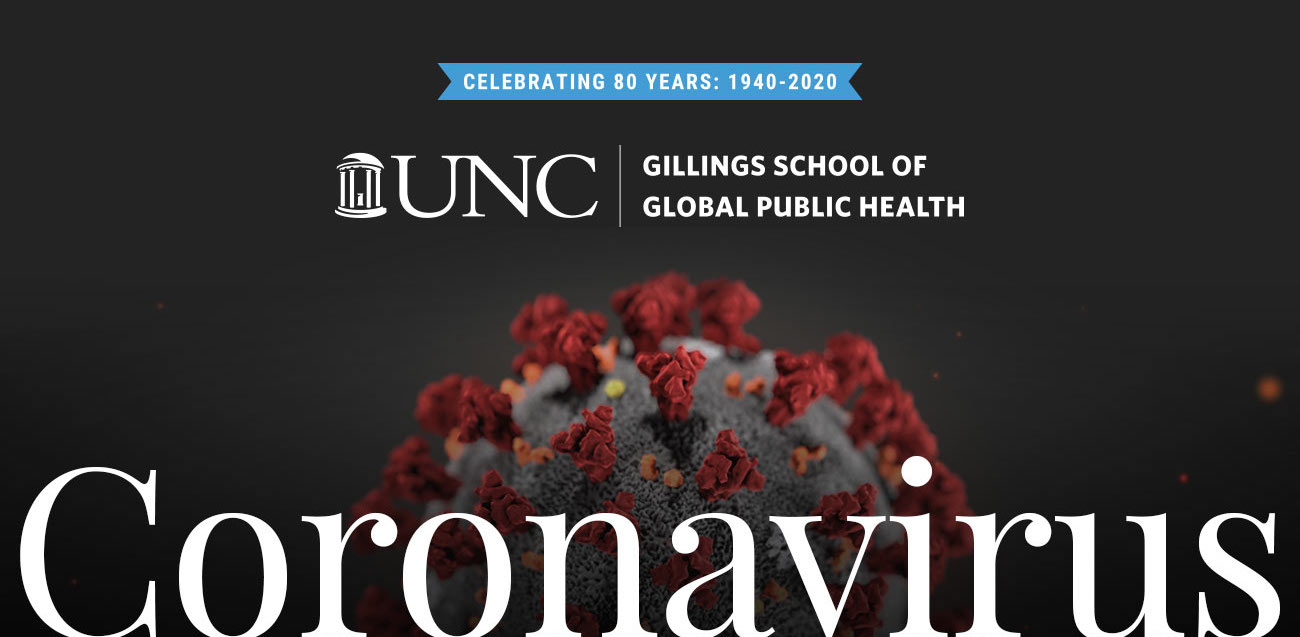The Gillings Community Responds to COVID-19: Local Leadership with Statewide Impact

July 13, 2020
The challenge that COVID-19 poses across the globe epitomizes the importance of public health education and research. At the UNC Gillings School of Global Public Health, students, alumni and faculty from across disciplines are working tirelessly to put learning into action in the face of a global health crisis.
Master of Public Health alumnus supporting North Carolina’s emergency management response to COVID-19

William Ray
Since March, William Ray, MPH, has been an active part of the North Carolina Department of Public Safety’s (DPS) response to COVID-19. Ray – who graduated from the Gillings School’s Public Health Leadership Program (PHLP) with a Master of Public Health (MPH) degree in 2010 and also holds a graduate certificate in Community Preparedness and Disaster Management (CPDM) from the Department of Health Policy and Management– serves as the Chief of Staff for the Division of Emergency Management and the Office of Recovery and Resiliency within DPS.
We recently asked Ray about how his experience at Gillings eventually led him to a career managing an emergency response right here in our home state and the challenges that come with coordinating public health and public safety efforts in the midst of a pandemic.
Q: How did you come to find yourself in the field of emergency management? Did your experience at Gillings influence this?
Ray: My time at Gillings had a significant impact on and directly supported my move into emergency management. The PHLP program was a great fit for me and was my entry point to the CPDM program. Particularly through faculty mentorship, the CPDM program had a direct impact on my professional trajectory, leading to my field practicum and then to job opportunities post-graduation. As part of my studies in PHLP, I was able to tailor my own MPH focus on emergency preparedness and the intersection of health policy, public health practice and emergency management. That intersection allowed me to see the tangible impacts we can have as we work to prepare communities, respond to assist communities and support community recovery in more resilient ways.
Q: Can you talk about the day-to-day (or moment-to-moment) of your division’s COVID-19 response?
Ray: North Carolina takes an all-hazards approach to emergency preparedness and response. By that, I mean the development of capabilities and capacity to respond to a range of hazards or incidents likely to impact the state. This allows us to be adaptable and scalable in both preparedness, response, and recovery efforts.
The Department of Public Safety’s Division of Emergency Management functions as the lead coordinating agency for state response and designates a lead technical agency based on the specific hazard or threat. For a pandemic such as this, the Department of Health and Human Services (DHHS) is our technical lead agency. The partnership between DHHS and DPS has been vital to a coordinated effort to combat this virus here in North Carolina.
Since the beginning of this event, we have worked daily in a unified command between DHHS and DPS. The State Emergency Operations Center has been activated for over 120 days, the DHHS and DPS teams have been diligently working on this response well before then, and we are anticipating this will continue as we look to hurricane season and other events coming later this year.
The State Emergency Response Team has a number of operational priorities currently. We are supporting healthcare organizations and long-term care facilities statewide with personal protective equipment (PPE), expansion of testing and tracing efforts, refinement of medical surge plans with the healthcare sector, and maintaining both food supply chain function and food supply access for vulnerable populations and those that rely on school nutrition programs or food banks. We are continuing to source and procure PPE to ensure adequate supply as we move through this event.
In the midst of all of this, we are also working on preparedness efforts for hurricane season, as well as preparing for national special security events and elections later this year.
Q: What stands out as some of the greatest challenges you face in your role, particularly as it pertains to public health?
Ray: Limited access to essential services continues to pose a significant challenge for many North Carolinians, and the cascading impacts of that limited access are magnified during a pandemic. Many face barriers to physical and mental health care, stable food supply, medical equipment or supplies, or secure and sustainable long-term housing. In an event such as this pandemic, as well as in other emergencies such as a hurricane, we see these barriers magnified for the most vulnerable members of our population.
One of our greatest challenges and charges is to help overcome these barriers, and we do that largely through strong governance, to include coordination across government agencies and public-private partnerships, and a reliance on data, much of which originates from academic partnerships with governmental agencies.
You can learn more about the North Carolina Division of Emergency Management and the Office of Resiliency and Recovery on the NC DPS website.
Read about other Gillings alumni and affiliated students who are also leaders in local COVID-19 public health response!
Gibbie Harris (’91 MSPH), Mecklenberg County Health Director: ‘First a candy-striper then a nurse. Gibbie Harris is in the middle of her career’s biggest crisis.’
Local leaders in the Emerging Leaders in Public Health national program (through the North Carolina Institute for Public Health): ‘Emerging Leaders in Public Health respond to COVID-19 in local communities.’
See more general information about COVID-19 at the Gillings School’s Coronavirus Information Portal.
Read more about how Gillings students and alumni are responding to the COVID-19 pandemic in our previous feature.
Find a roundup of all our experts’ coronavirus-related media outreach in this Twitter moment.
Contact the UNC Gillings School of Global Public Health communications team at sphcomm@unc.edu.
